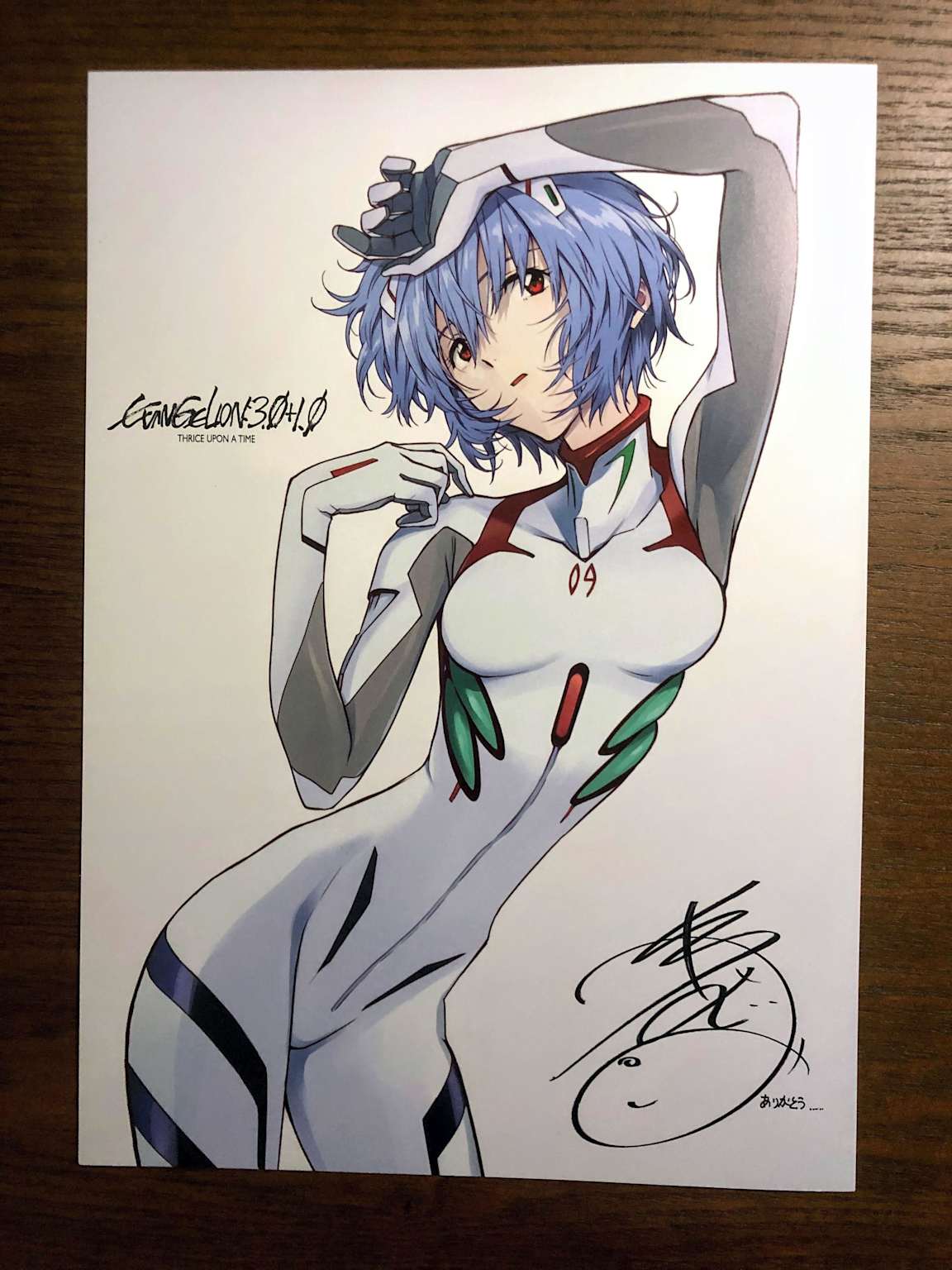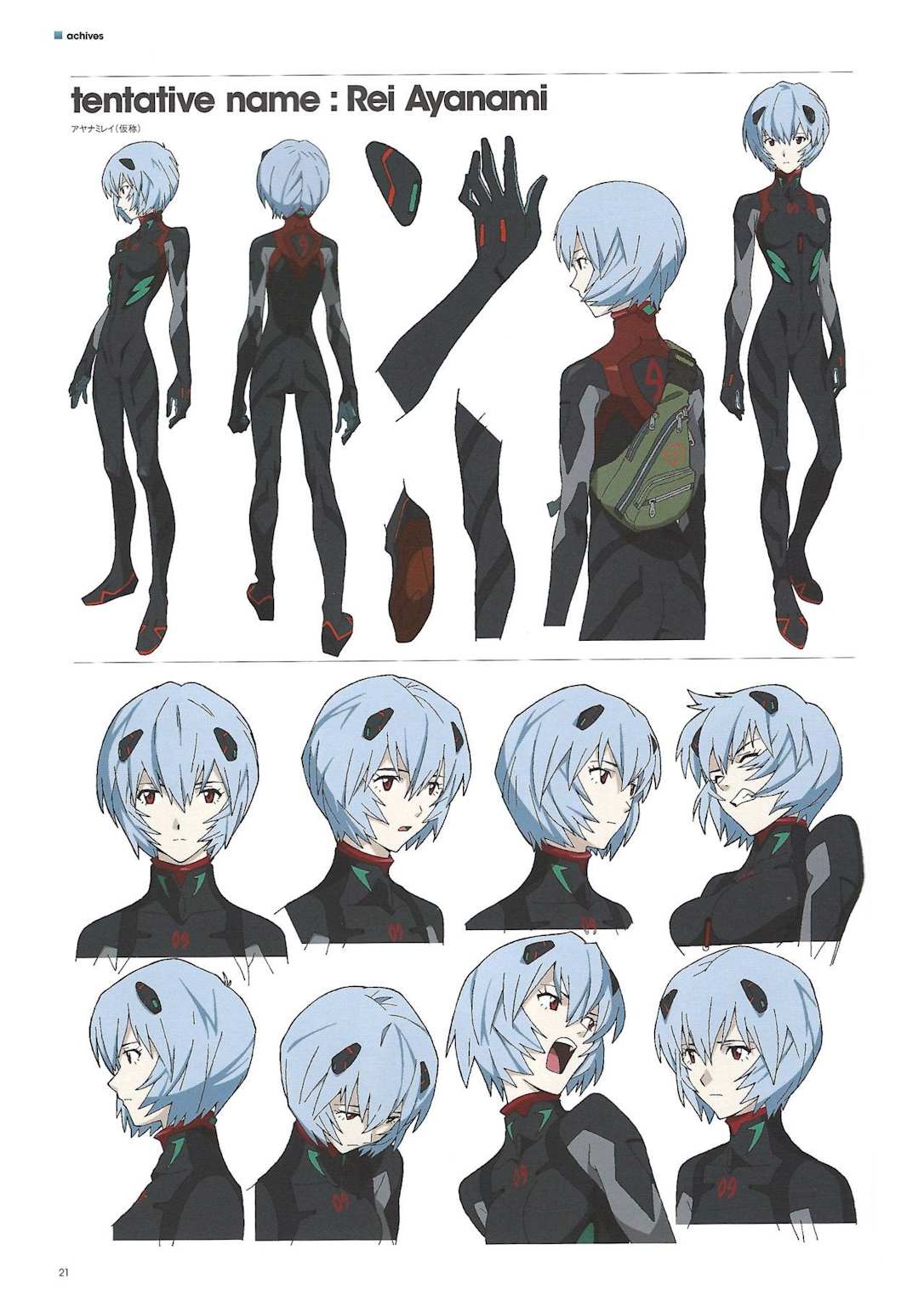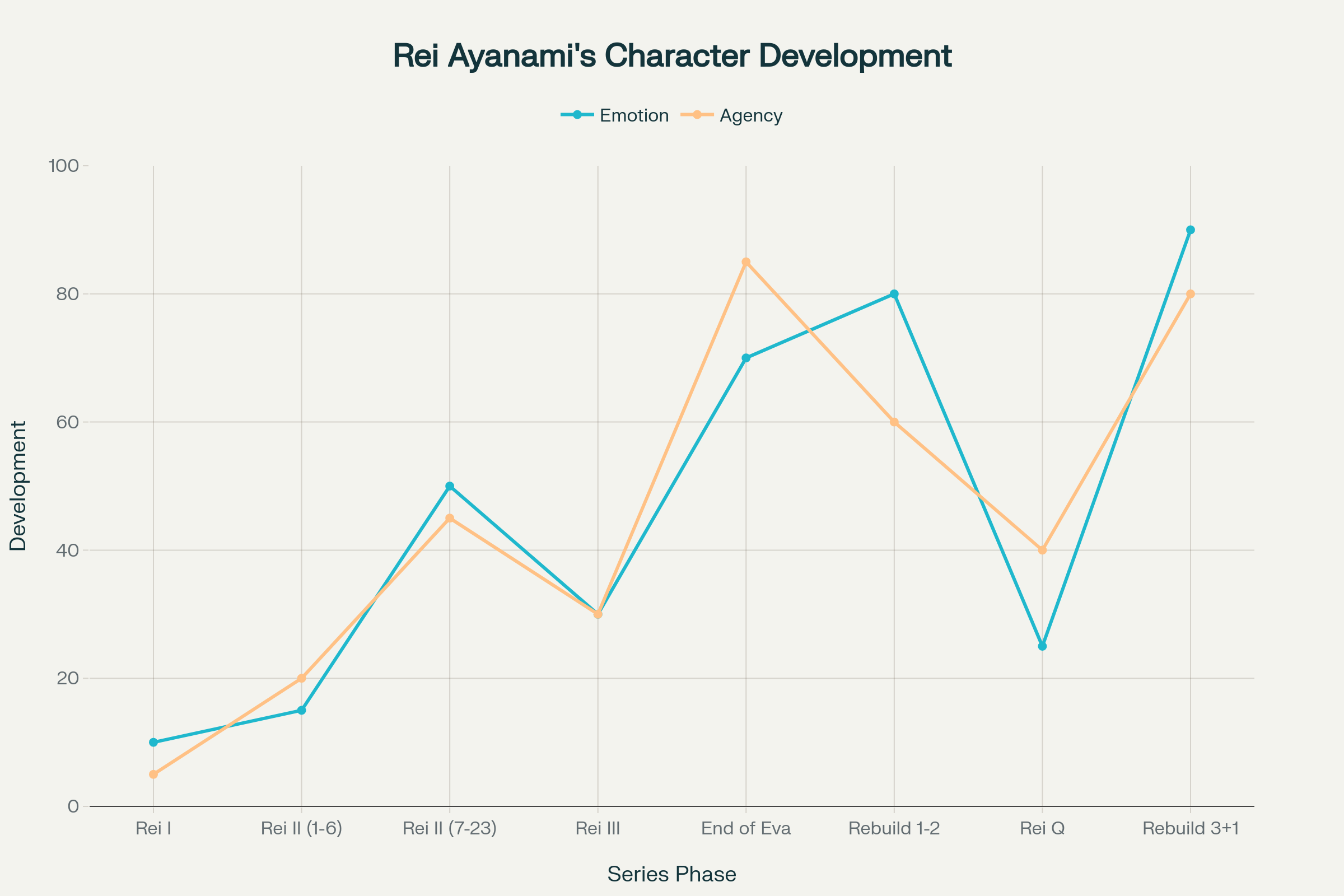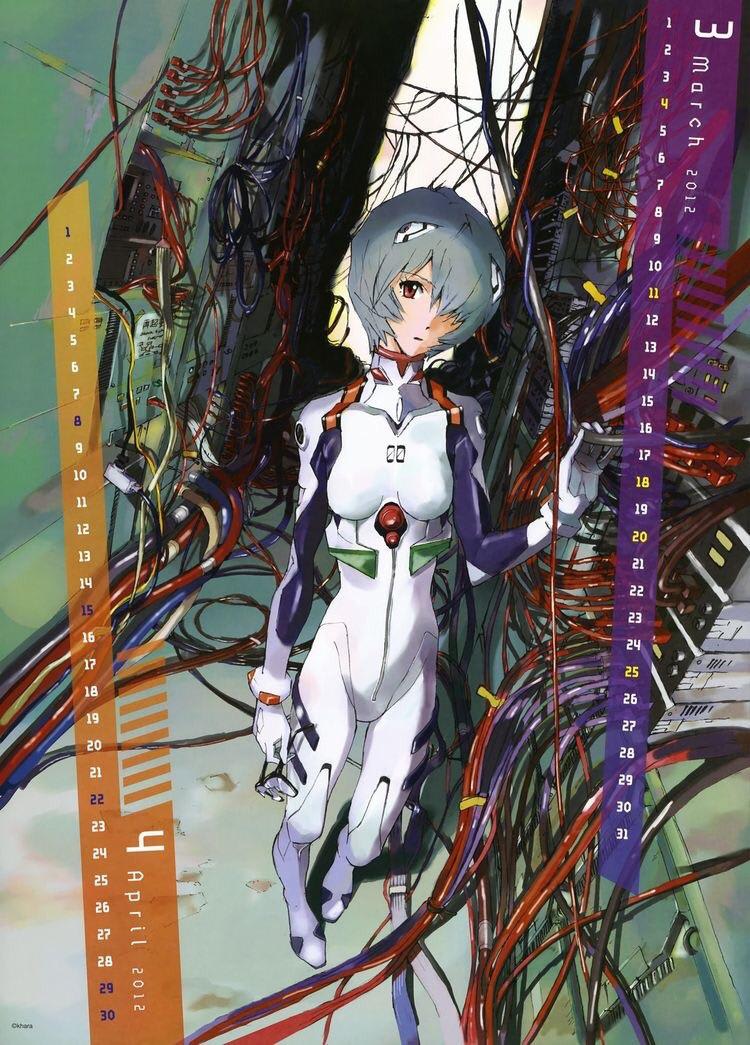Character Overview
Basic Information
Name: Rei Ayanami (綾波 レイ)
Age: 14 (biologically)
Role: First Children, Pilot of Evangelion Unit-00
True Nature: Clone created from Yui Ikari's genetic material and Lilith's soul
Physical Appearance
Hair: Distinctive pale blue
Eyes: Red
Skin: Alabaster white
Attire: White plugsuit with black, orange, and green accents
Core Traits
Stoicism: Remarkable emotional restraint
Introspection: Deep contemplation about purpose
Loyalty: Initially devoted to Gendo Ikari
Resilience: Endures psychological trauma

Rei Ayanami in her iconic white plugsuit, representing her ethereal and otherworldly nature.
The Multiple Incarnations
Rei Ayanami exists across multiple incarnations throughout the Evangelion series, each representing different stages of development and identity:

Character design sheet showing Rei's various expressions and incarnations across the series.
| Incarnation | Time Period | Key Traits | Fate | Emotional Range |
|---|---|---|---|---|
| Rei I | 2010 (Flashback) | Child-like, naive, manipulated | Killed by Naoko Akagi | Limited - child-like wonder |
| Rei II | 2015 (Episodes 1-23) | Emotionless tool, gradual awakening | Dies destroying Armisael | Minimal to growing awareness |
| Rei III | 2015 (Episodes 24-26, EoE) | Memory gaps, identity confusion | Chooses to help Shinji in Instrumentality | Confused but developing agency |
| Rei (Rebuild) | 2015 (Rebuild 1.0-2.0) | More human, curious, emotional growth | Continues development | Expanded emotional capacity |
| Rei Q | 2015 (Rebuild 3.0) | Complete amnesia, seeking identity | Sacrifices self to save others | Seeking, questioning, vulnerable |
| Rei (Final) | 2015 (Rebuild 3.0+1.0) | Fully realized, finds belonging | Finds new life and purpose | Full emotional maturity |
Character Development Timeline
Rei's character development follows a complex trajectory that varies significantly across different versions of the Evangelion narrative. Her evolution can be understood through multiple distinct phases:
Development Progression Chart

Visual representation of Rei's emotional development and agency growth across different series phases.
Key Development Phases
Tool-like Existence (Early Series)
Functions primarily as an instrument of others' will, displaying mechanical responses and emotional detachment.
Emotional Awakening (Mid-Series)
Begins questioning her purpose and developing feelings, particularly through interactions with Shinji.
Identity Crisis (Late Series)
Struggles with multiple deaths, rebirths, and memory gaps while seeking to understand her true self.
Self-Actualization (Films)
Achieves agency and makes independent choices, ultimately finding her place in the world.
Psychological Analysis
Relationship Dynamics
With Shinji Ikari
Initial Phase: Professional distance, protective instinct
Development: Mutual understanding, emotional connection
Significance: Shinji represents humanity and emotional growth for Rei
With Gendo Ikari
Nature: Complex mix of reverence, dependency, and eventual rebellion
Psychology: Represents father figure and source of validation
Resolution: Chooses humanity over Gendo's instrumentality plans
Symbolic Significance
- Mother Archetype: Embodies maternal protection and nurturing potential
- Identity and Authenticity: Questions what makes someone "real" or human
- Agency and Free Will: Journey from predetermined tool to self-determining individual
- Existential Questions: Can artificial consciousness develop authentic emotions?

Rei in her distinctive plugsuit, embodying her role as an Eva pilot and her journey toward self-discovery.
Character Development Data
The following table provides a comprehensive breakdown of Rei's character progression across different phases of the Evangelion series:
| Phase | Key Characteristics | Relationship with Shinji | Major Development | Symbolic Role |
|---|---|---|---|---|
| Rei I (Flashback) | Child clone, naive, manipulated by Gendo | No direct interaction | Killed by Naoko Akagi for repeating Gendo's words | Innocent victim of adult manipulation |
| Rei II (Episodes 1-6) | Cold, emotionless, tool-like behavior | Distant, professional, protective | Smiles for the first time after Shinji's kindness | Dehumanized tool, lack of self-worth |
| Rei II (Episodes 7-23) | Gradual awakening to emotions, connection with Shinji | Growing connection, mutual understanding | Learns to value herself, questions her purpose | Awakening humanity, mother figure potential |
| Rei III (Episodes 24-26) | Memory gaps, questioning identity, blank slate | Confused, trying to rebuild connection | Struggles with fragmented identity | Rebirth, second chances, memory and identity |
| End of Evangelion | Chooses humanity over Gendo, rebels against instrumentality | Chooses to help Shinji over Gendo | Asserts individual will, rejects being a doll | Choice and free will, rejection of predetermined fate |
| Rebuild 1.0-2.0 | More humanized, shows curiosity and growth | Genuine friendship, shared meals, emotional growth | Experiences normal teenage life, cooking, friendship | Growth and possibility, normal human experience |
| Rei Q (3.0) | Complete memory loss, identity crisis, seeking belonging | Rejected initially, seeks acceptance | Existential questioning, "Who am I?" | Identity crisis, the search for self |
| Rebuild 3.0+1.0 | Finds family, learns love, sacrifice for others | Protective, caring, finds purpose through connection | Accepts her place in the world, finds belonging | Resolution, finding home, completing the journey |
Clinical Observations
Trauma Responses:
- Dissociation: Emotional detachment as protective mechanism
- Learned Helplessness: Initial acceptance of mistreatment
- Attachment Issues: Difficulty forming healthy relationships
Growth Indicators
Development Markers:
- Emotional Recognition: Learning to identify and express feelings
- Boundary Setting: Developing ability to assert preferences
- Identity Formation: Moving from external to internal validation
Conclusion
Rei Ayanami's character arc represents a profound meditation on what it means to be human. Her journey from tool to individual, from disposable clone to irreplaceable person, mirrors real struggles with self-worth, identity, and the courage to choose one's own path.
Through her development, she becomes not just a character but a symbol of resilience, growth, and the fundamental human need for connection and purpose. Her story ultimately suggests that humanity is not defined by biological origin but by the capacity for growth, choice, and genuine care for others—a message that resonates far beyond the confines of science fiction.

Official artwork highlighting Rei's connection to the technological and mysterious themes of Evangelion.